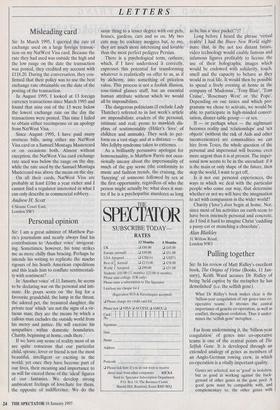Personal opinion
Sir: I am a great admirer of Matthew Par- ris's journalism and nearly always find his contributions to 'Another voice' invigorat- ing. Sometimes, however, his tone strikes me as more chilly than bracing. Perhaps he intends his writing to replicate the macho rigours of his South American expeditions and this leads him to conflate sentimentali- ty with sentiment?
In 'Another voice' of 11 January, he seems to be declaring war on the personal and inti- mate. He pours scorn on 'the hug for a favourite grandchild, the lump in the throat, the adored pet, the treasured daughter, the private tear' which 'are not the signs of a vir- tuous man; they are the means by which a callous man excludes the outside world from his mercy and justice. He will exercise his sympathies within domestic boundaries. Charity, beginning at home, ends there.'
If we have any sense of reality most of us are quite conscious that our particular child, spouse, lover or friend is not the most beautiful, intelligent or exciting in the world; yet once they have become part of our lives, their meaning and importance to us will far exceed those of the 'ideal' figures of our fantasies. We develop strong ambivalent feelings of love/hate for them, the opposite of indifference. We do the same thing to a lesser degree with our pets, houses, gardens, cars and so on. My two cats may be cockney moggies but, to me, they are much more interesting and lovable than the most perfect pedigree Persian.
There is a psychological term, cathexis, which, if I have understood it correctly, expresses this potential for transforming whatever is realistically on offer to us, as if by alchemy, into something of priceless value. This process is not a foolish illusion, rose-tinted glasses stuff, but an essential human attribute without which we would all be impossibilists.
The dangerous politicians (I exclude Lady Thatcher) referred to in last week's article are impossibilists: evaders of the personal, intimate and real; prone to mawkish dis- plays of sentimentality (Hitler's 'love' of children and animals). They seek to per- form on a vast stage and at a distance — the Mrs Jellyby syndrome taken to extremes.
As a brilliantly persuasive apologist for homosexuality, is Matthew Parris not occa- sionally uneasy about the impersonality of much of the gay scene (the conformity to music and fashion trends, the cruising, the `fancying' of someone followed by sex at the first opportunity, regardless of who the person might actually be: what does it mat- ter if he is a psychopathic murderer. as long as he has a 'nice packet'?)? Long before I heard the phrase 'virtual reality' I had the Brave New World night- mare that, in the not too distant future, video technology would enable famous and infamous figures profitably to license the use of their holographic images which would be endowed with solidarity, touch, smell and the capacity to behave as they would in real life. It would then be possible to spend a lively evening at home in the company of 'Madonna', 'Tony Blair', 'Tom Cruise', 'Rosemary West' or 'the Pope'. Depending on our tastes and which pro- gramme we chose to activate, we would be able to participate in high-minded conver- sation, dinner-table gossip — or sex.
If — or perhaps when — the nightmare becomes reality and 'relationships' and 'sex objects' (without the risk of Aids and other inconveniences) are commodities we can hire from Tesco, the whole question of the personal and impersonal will become even more urgent than it is at present. The imper- sonal now seems to be in the ascendant: if it is the main or only shape of the future, then stop the world, I want to get off.
Is it not our personal experiences, the ways in which we deal with the particular people who come our way, that determine whether or not we will have the imagination to act with compassion in the wider world?
Charity (`love') does begin at home. Nor, since most of his activities on earth seem to have been intensely personal and concrete, do I find it hard to imagine Christ 'cuddling a pussy-cat or munching a chocolate'.
Alan Blaikley
31 Willow Road, London NW3


























































 Previous page
Previous page